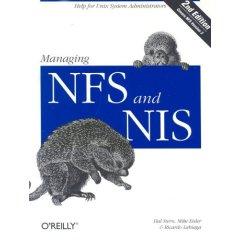| 2020ok Directory of FREE Online Books and FREE eBooks |
Free eBooks > Computers & Internet > Operating Systems > Unix > Administration > Managing NFS and NIS, 2nd Edition
Managing NFS and NIS, 2nd Editionby Hal Stern  Download Book If you are the author or the publisher, and would like to link to your site here, please contact us. About Book Amazon.com Cross-platform file sharing under Network File System (NFS) is so reliable that in most organizations, it works pretty much unattended. Ditto for the directory services that Network Information System (NIS) provides. Managing NFS and NIS is for people who want to know more about how NFS and NIS do their vital work, and how to make them operate in unusual circumstances. Focused on the Solaris and Linux implementations of NFS and NIS, this book is ideal for the Unix system administrator who's familiar with TCP/IP networking and everyday system administration. The second edition of this book eliminates much of the programming material that appeared in its predecessor and replaces it with information on NFS 3, its support of IPsec and Kerberos security, and its operation under Solaris 8. This is a blue O'Reilly book, packed to the gunwales with information of interest to people in a hurry to optimize their systems and resolve difficulties. It's easy to locate the passage you need via the index or through the table of contents, and most entries provide a great mix of how-to material (in the form of input-and-output listings) and explanatory text (expert commentary, often with notes on applicable variations). If there's a command, option, or configuration parameter associated with NIS or NFS, you'll find documentation of it here. --David Wall Topics covered: Network File System (NFS) and Network Information System (NIS) for Unix machines, especially Solaris (through version 8) and Linux (through version 2.2). Auto mounting, security, diskless workstations, and performance tuning are among the many details the authors address.
Book Info With this new edition, readers can plan, set up, and debug an NFS network. Covers all the details on network performance tuning. Covers Version 3 and the new security features, including integration with Kerberos. Softcover. Previous edition c1991. The publisher, O'Reilly and Associates A modern computer system that is not part of a network is an anomaly. But managing a network and getting it to perform well can be a problem. This book describes two tools that are absolutely essential to distributed computing environments: the Network Filesystem (NFS) and the Network Information System (formerly called the "yellow pages" or YP). The Network Filesystem, developed by Sun Microsystems, is fundamental to most UNIX networks. It allows systems ranging from PCs running DOS to UNIX workstations to large mainframes to access each other's files transparently. It is the standard method for sharing files between different computer systems. As popular as NFS is, it is a "black box" for most users and administrators. This book provides a comprehensive discussion of how to plan, set up, and debug an NFS network. It is the only book we're aware of that discusses NFS and network performance tuning. This book also covers the NFS automounter, network security issues, diskless workstations, and PC/NFS. NFS isn't really complete without its companion, NIS. NIS provides a distributed database service for managing the most important administrative files, such as the passwd file and the hosts file. NIS centralizes administration of commonly replicated files, letting you make a single change to the database rather than making changes on every system on the network. This book tells you how to set up and use NIS to simplify network management. It also tells you how to use NIS to manage your own database applications, ranging from a simple telephone list to controlling access to network services. If you are managing a network of UNIX systems, or are thinking of setting up a UNIX network, you can't afford to overlook this book. Related Free eBooks
| Related Tags |












SEND A COMMENT
PLEASE READ: All comments must be approved before appearing in the thread; time and space constraints prevent all comments from appearing. We will only approve comments that are directly related to the article, use appropriate language and are not attacking the comments of others.